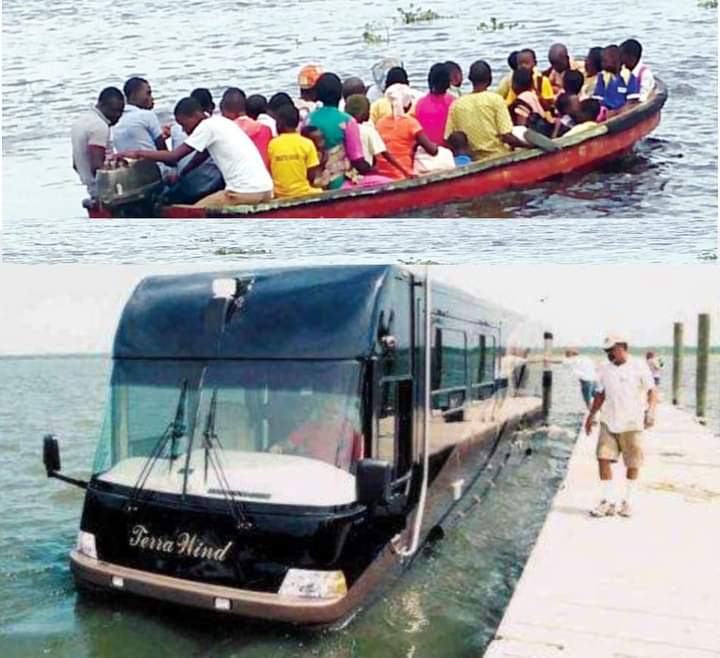WATER TRANSPORT: The Most Neglected Means of Transport in Nigeria and its Effect on Coastal Dwellers By Abai Francis

Traveling within the Niger Delta and to other Nigerian states that are connected by water is easier done by road transport (through vehicles/railways) or by air transport (through aeroplanes), but certainly not by water transport. And for majority of inhabitants in the coastal settlements of the delta, this places more burdens on their shoulders.
For instance, the journey of Ebitimi (not real names) from the creeks in Delta state to Lagos state is one that portrays the series of ordeals that citizens residing in the coast have to go through when traveling to nearby or distant cities.
Ebitimi is a native of one of the coastal settlements known as Ogulagha in the Burutu local government area of Delta state. He had relatives in Lagos and had planned on a certain day to visit. His journey could have been easier by way of water transport. All he had to do was to board a passenger ferry boat from Ogulagha to Lagos in a journey that would not span more than five hours.
But in the absence of such means of transportation, Ebitimi had no choice than to first depart Ogulagha for the city of Warri in a bumpy hour's journey. And then in Warri, he will have to board a transport vehicle for another seven to eight hours journey (barring no traffic jam) from Warri to Lagos. In all, he would not only spend more hours (time), he will also have to pay more to cover the cost of transportation from Ogulagha to Warri and then from Warri to Lagos.
Of all the transport modes in Nigeria, water transport does not only take the back seat, it is totally ignored by both the state and federal government as there exist no organised public water transport scheme. While governments spend huge amounts of money to build airports, to construct railway tracks and stations as well as roads and bridges to provide for transport by air and land, no thought is given to water as a means of transport.
The neglect of water transport by the government is so glaring that there are no infrastructures put in place by it to attract local and foreign investors in that area. Remember that it is the duty of government to create the enabling environment for business to thrive, and water transport is one business that the government can leverage on to reduce unemployment rate in the region thereby curbing criminality. But no one seems to be giving a thought to that.
At present, water transport is being organised locally by the private sector without any or poor government regulation. And so, there are no adequate security to man the waterways so as to curb acts of robbery on the waterways, no signs along the routes to depict shallow depths or to give direction to travelers just as it exists in road transport. Moreover, enacted laws such as the compulsory wearing of life saving vests are not or are poorly implemented.
Another vital area in water transport is the poor state of transport vehicles (boats). There are no laws, to the best of my knowledge, regulating the viability of transport vehicles that ply the waterways. There are many cases of the use of substandard boats to ferry passengers, an act that puts travelers in jeopardy most often when these poor and ill-maintained boats break down in the middle of no where. Most worrisome is the absence of comfort as most of the commercial ferry boats have no shelter to prevent the heat of the sun or downpour during the rainy season. This leaves passengers in a "make-we-manage" situation despite paying high transport fares.
While there exist the Federal Road Safety Commission (FRSC) to preside over transport on land and the Nigerian Airspace Management Agency (NAMA) to preside over air transport, their counterpart, the Nigerian Maritime Administration and Safety Agency (NIMASA) that regulates the maritime industry seems to beam less of its focus on local means of water transport.
Because majority of the Nigerian population make use of land transport, the issue of poor roads have dominated the nation's infrastructures. This has caused uncountable deaths as Nigerians die daily from road mishaps since most Nigerians are not buoyant enough to use air transport. While the federal government is commended for trying to resuscitate railway as an alternative means in land transport, it should likewise beam its attention also on water transport. This would no doubt take the pressure off the roads which will also become durable, thereby helping to reduce the waste of funds in frequent road construction and maintenance as well as save lives.
The state governments in the southern region have also poorly performed as regards water transport. Since majority of the southern states are linked by water, what stops the governors in the region from developing a blueprint on water transport? Such will definitely create employment for citizens as well as enhance trade among states in the region. Moreover, water transport will lessen the burden of coastal dwellers most of whom are below the poverty line.
This is therefore an appeal to both the state and federal governments to look into the mode of water transport. Coastal dwellers pay more for virtually everything (including the fuel explored in their terrain) simply because the prices of commodities are high as a result of the high cost of transport charged by the private sector. And so, interventions should be made to the private sector; effective marine laws regulating local water transport should be enacted and implemented, as well as the requisite infrastructures put in place, all in a bid to properly organise local or national water transport and to make it affordable too. The government cannot say it wants to reduce the level of poverty if it continues to ignore local water transport which presents opportunities for economic growth.
#mypublicdiscourse #watertransport



